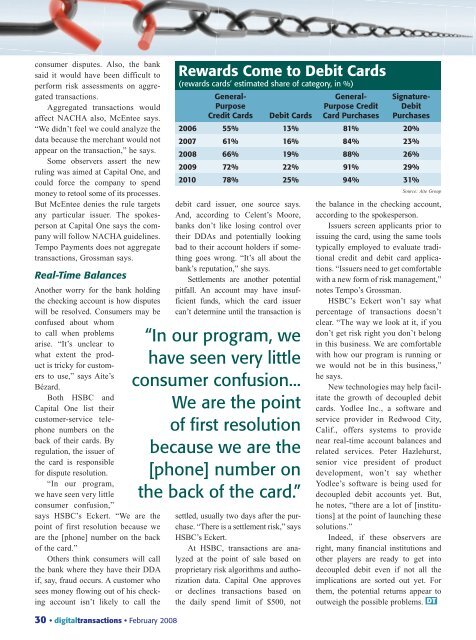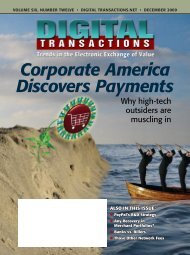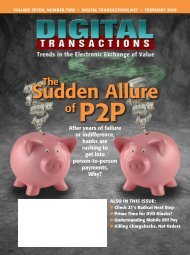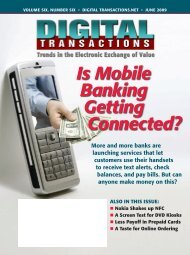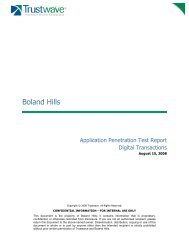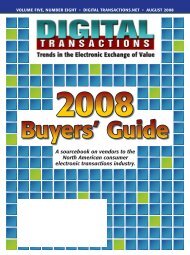The Broken Link - Digital Transactions
The Broken Link - Digital Transactions
The Broken Link - Digital Transactions
Create successful ePaper yourself
Turn your PDF publications into a flip-book with our unique Google optimized e-Paper software.
consumer disputes. Also, the bank<br />
said it would have been difficult to<br />
perform risk assessments on aggregated<br />
transactions.<br />
Aggregated transactions would<br />
affect NACHA also, McEntee says.<br />
“We didn’t feel we could analyze the<br />
data because the merchant would not<br />
appear on the transaction,” he says.<br />
Some observers assert the new<br />
ruling was aimed at Capital One, and<br />
could force the company to spend<br />
money to retool some of its processes.<br />
But McEntee denies the rule targets<br />
any particular issuer. <strong>The</strong> spokesperson<br />
at Capital One says the company<br />
will follow NACHA guidelines.<br />
Tempo Payments does not aggregate<br />
transactions, Grossman says.<br />
Real-Time Balances<br />
Another worry for the bank holding<br />
the checking account is how disputes<br />
will be resolved. Consumers may be<br />
confused about whom<br />
to call when problems<br />
arise. “It’s unclear to<br />
what extent the product<br />
is tricky for customers<br />
to use,” says Aite’s<br />
Bézard.<br />
Both HSBC and<br />
Capital One list their<br />
customer-service telephone<br />
numbers on the<br />
back of their cards. By<br />
regulation, the issuer of<br />
the card is responsible<br />
for dispute resolution.<br />
“In our program,<br />
we have seen very little<br />
consumer confusion,”<br />
says HSBC’s Eckert. “We are the<br />
point of first resolution because we<br />
are the [phone] number on the back<br />
of the card.”<br />
Others think consumers will call<br />
the bank where they have their DDA<br />
if, say, fraud occurs. A customer who<br />
sees money flowing out of his checking<br />
account isn’t likely to call the<br />
30 • digitaltransactions • February 2008<br />
Rewards Come to Debit Cards<br />
(rewards cards’ estimated share of category, in %)<br />
General-<br />
Purpose<br />
Credit Cards Debit Cards<br />
General-<br />
Purpose Credit<br />
Card Purchases<br />
Signature-<br />
Debit<br />
Purchases<br />
2006 55% 13% 81% 20%<br />
2007 61% 16% 84% 23%<br />
2008 66% 19% 88% 26%<br />
2009 72% 22% 91% 29%<br />
2010 78% 25% 94% 31%<br />
debit card issuer, one source says.<br />
And, according to Celent’s Moore,<br />
banks don’t like losing control over<br />
their DDAs and potentially looking<br />
bad to their account holders if something<br />
goes wrong. “It’s all about the<br />
bank’s reputation,” she says.<br />
Settlements are another potential<br />
pitfall. An account may have insufficient<br />
funds, which the card issuer<br />
can’t determine until the transaction is<br />
“In our program, we<br />
have seen very little<br />
consumer confusion...<br />
We are the point<br />
of first resolution<br />
because we are the<br />
[phone] number on<br />
the back of the card.”<br />
settled, usually two days after the purchase.<br />
“<strong>The</strong>re is a settlement risk,” says<br />
HSBC’s Eckert.<br />
At HSBC, transactions are analyzed<br />
at the point of sale based on<br />
proprietary risk algorithms and authorization<br />
data. Capital One approves<br />
or declines transactions based on<br />
the daily spend limit of $500, not<br />
Source: Aite Group<br />
the balance in the checking account,<br />
according to the spokesperson.<br />
Issuers screen applicants prior to<br />
issuing the card, using the same tools<br />
typically employed to evaluate traditional<br />
credit and debit card applications.<br />
“Issuers need to get comfortable<br />
with a new form of risk management,”<br />
notes Tempo’s Grossman.<br />
HSBC’s Eckert won’t say what<br />
percentage of transactions doesn’t<br />
clear. “<strong>The</strong> way we look at it, if you<br />
don’t get risk right you don’t belong<br />
in this business. We are comfortable<br />
with how our program is running or<br />
we would not be in this business,”<br />
he says.<br />
New technologies may help facilitate<br />
the growth of decoupled debit<br />
cards. Yodlee Inc., a software and<br />
service provider in Redwood City,<br />
Calif., offers systems to provide<br />
near real-time account balances and<br />
related services. Peter Hazlehurst,<br />
senior vice president of product<br />
development, won’t say whether<br />
Yodlee’s software is being used for<br />
decoupled debit accounts yet. But,<br />
he notes, “there are a lot of [institutions]<br />
at the point of launching these<br />
solutions.”<br />
Indeed, if these observers are<br />
right, many financial institutions and<br />
other players are ready to get into<br />
decoupled debit even if not all the<br />
implications are sorted out yet. For<br />
them, the potential returns appear to<br />
outweigh the possible problems. DT


